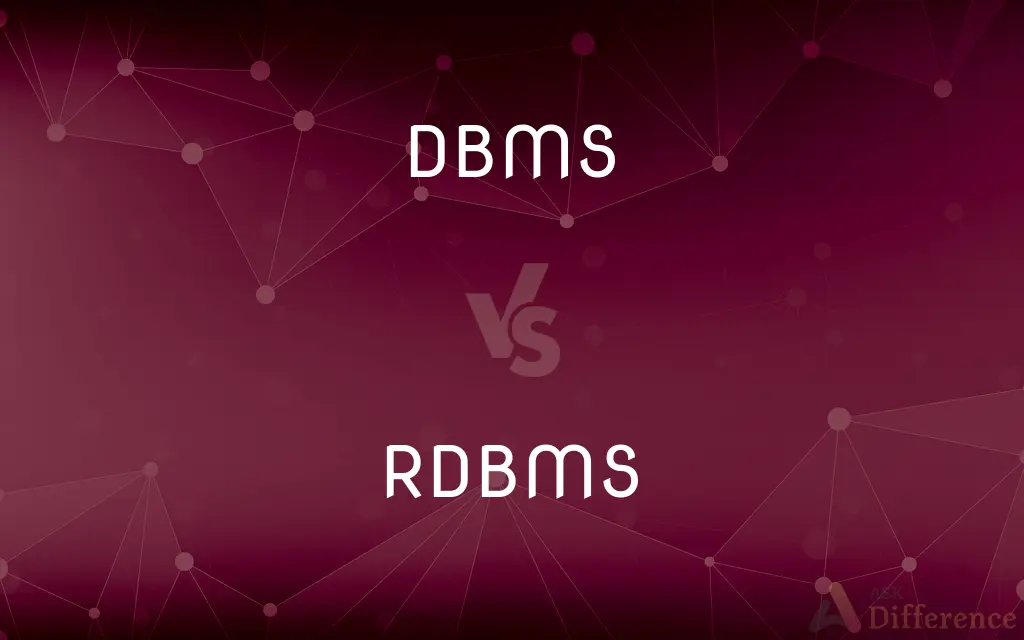DBMS vs. RDBMS — What's the Difference?
By Tayyaba Rehman — Published on January 4, 2024
DBMS (Database Management System) is a software system to manage, store, and retrieve data efficiently. RDBMS (Relational Database Management System) is a DBMS that uses a structured approach with tables and relationships.

Difference Between DBMS and RDBMS
Table of Contents
ADVERTISEMENT
Key Differences
A Database Management System (DBMS) is software designed to manage, store, and retrieve data efficiently. It provides a structured way to interact with databases, allowing users to create, update, and retrieve data while ensuring data integrity and security. DBMS can be used for various data-related tasks, from storing customer information to managing inventory in a business.
A Relational Database Management System (RDBMS) is a type of DBMS that follows a structured approach using tables, where data is organized into rows and columns. RDBMS enforces relationships between tables, ensuring data consistency and allowing for complex queries using SQL (Structured Query Language). It is particularly suitable for applications that require well-defined data structures and relationships, such as financial systems and e-commerce platforms.
The primary difference between DBMS and RDBMS lies in data structure. DBMS may not necessarily organize data into structured tables and relationships, while RDBMS specifically uses a tabular structure with defined relationships between tables.
DBMS systems offer more flexibility in terms of data storage and retrieval methods. They are suitable for scenarios where data structures are not well-defined or may change frequently. RDBMS, on the other hand, enforces a strict structure and is ideal for applications where data integrity and consistency are critical.
DBMS is commonly used in scenarios like document management, content management, and data warehousing. RDBMS is preferred when applications require a highly structured and organized approach, such as customer relationship management (CRM) systems and financial record-keeping.
ADVERTISEMENT
Comparison Chart
Definition
Manages data efficiently
Organizes data in tables with relationships
Data Structure
Flexible, non-tabular
Tabular with defined relationships
Flexibility
Suitable for varied data structures
Enforces structured data
Use Cases
Document management, data warehousing
CRM, financial systems, e-commerce
Compare with Definitions
DBMS
DBMS ensures data security.
Our DBMS protects sensitive company data.
RDBMS
An RDBMS uses tables and relationships for data organization.
Our RDBMS stores customer data in structured tables.
DBMS
A Database Management System (DBMS) manages data efficiently.
Our DBMS stores and retrieves customer information.
RDBMS
RDBMS enforces data integrity.
The RDBMS prevents duplicate entries in our database.
DBMS
DBMS offers flexibility in data storage.
We use a DBMS to handle diverse data formats.
RDBMS
RDBMS ensures consistency in data management.
The RDBMS maintains accurate product information.
DBMS
DBMS simplifies data retrieval.
The DBMS makes it easy to find product information.
RDBMS
RDBMS is ideal for well-defined data structures.
Our financial records rely on the structured RDBMS.
DBMS
DBMS supports various data operations.
With a DBMS, we can update inventory levels.
RDBMS
RDBMS supports complex queries with SQL.
We use SQL queries in the RDBMS for analytics.
DBMS
A database management system, a software system that facilitates the creation and maintenance and use of an electronic database.
DBMS
A software system that facilitates the creation and maintenance and use of an electronic database
Common Curiosities
In what scenarios is an RDBMS preferred?
RDBMS is preferred when applications require well-defined data structures, relationships, and data consistency, such as CRM systems and financial record-keeping.
Can you provide an example of a DBMS use case?
DBMS is often used in document management, content management, and data warehousing to handle diverse data formats and storage needs.
Is an RDBMS more secure than a DBMS?
Security depends on implementation, but both DBMS and RDBMS can offer robust security features to protect data.
What is the role of a DBA (Database Administrator) in managing DBMS and RDBMS?
A DBA is responsible for database design, performance optimization, security, and ensuring data consistency in both DBMS and RDBMS environments.
Is it possible to migrate from a DBMS to an RDBMS or vice versa?
Migration between DBMS and RDBMS may be possible but requires careful planning, data transformation, and application adjustments.
Can a DBMS handle structured data like an RDBMS?
Yes, some DBMS systems can handle structured data, but they provide more flexibility in handling unstructured or semi-structured data as well.
What is the key feature of an RDBMS that distinguishes it from a DBMS?
An RDBMS (Relational Database Management System) uses a structured approach with tables and relationships to organize data, enforcing data integrity.
Are there open-source DBMS and RDBMS options available?
Yes, there are open-source options for both DBMS (e.g., MySQL) and RDBMS (e.g., PostgreSQL).
What is a DBMS, and why is it used?
A DBMS (Database Management System) is used to efficiently manage, store, and retrieve data for various applications, ensuring data integrity and security.
How does SQL relate to RDBMS?
SQL (Structured Query Language) is commonly used with RDBMS to perform complex queries and operations on relational databases.
What are the common challenges associated with managing large-scale databases in RDBMS?
Managing large-scale databases in RDBMS may involve challenges related to performance optimization, data distribution, and ensuring high availability.
Can you provide an example of a situation where a DBMS without structured tables is preferred?
DBMS without structured tables may be preferred for storing and retrieving unstructured data, such as multimedia content in a content management system.
How do DBMS and RDBMS contribute to data security and privacy compliance?
Both DBMS and RDBMS provide features like access control, encryption, and audit trails to enhance data security and help organizations comply with privacy regulations.
What role does SQL play in managing data in both DBMS and RDBMS?
SQL is a standardized language used to interact with data in both DBMS and RDBMS, enabling tasks like querying, updating, and managing databases.
What is the primary goal of data normalization in RDBMS?
Data normalization in RDBMS aims to minimize data redundancy and improve data integrity by organizing data into separate related tables.
Share Your Discovery

Previous Comparison
C# List vs. C# Array
Next Comparison
SIMM vs. DIMMAuthor Spotlight
Written by
Tayyaba RehmanTayyaba Rehman is a distinguished writer, currently serving as a primary contributor to askdifference.com. As a researcher in semantics and etymology, Tayyaba's passion for the complexity of languages and their distinctions has found a perfect home on the platform. Tayyaba delves into the intricacies of language, distinguishing between commonly confused words and phrases, thereby providing clarity for readers worldwide.
















































